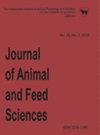妊娠早期绵羊脾脏核因子κ B组分表达的变化
IF 1.5
4区 农林科学
Q3 AGRICULTURE, DAIRY & ANIMAL SCIENCE
引用次数: 4
摘要
对胎儿抗原具有免疫耐受性,这是由妊娠期间的激素变化引起的(Fuhler,2020)。来自黄体(CL)的孕酮(P4)、来自孕体的妊娠识别信号(干扰素τ,IFNT)和子宫内膜分泌的前列腺素影响子宫功能,并有助于反刍动物的孕体延长、着床和妊娠(Spencer等人,2016)。概念信号(IFNT)和高浓度P4通过调节反刍动物妊娠早期子宫、外周免疫细胞和其他组织中的先天免疫系统,有助于免疫耐受(Ott,2020)。干扰素τ通过其旁分泌和内分泌作用,调节母体先天免疫系统,避免妊娠排斥反应,其他免疫调节因子,如模式识别受体,在反刍动物妊娠早期与IFNT并行工作(Rocha等人,2021)。模式识别受体有助于核因子κB(NF-κB)的激活,从而导致先天免疫反应的下游激活(Heilmann等人,2017)。核因子κB家族由NF-κB1(p50)、NF-κB2(p52)、RelA(p65)、RelB和c-Rel组成,参与免疫系统发育、炎症以及先天和适应性免疫反应的调节。正常妊娠的特征是对胎儿抗原的系统免疫耐受,脾脏有助于妊娠期间的适应性免疫耐受。核因子κB(NF-κB)信号参与脾脏免疫调节,但尚不清楚妊娠早期绵羊脾脏中NF-κB成分的表达是否发生变化。本研究的目的是探讨妊娠早期对绵羊母体脾脏中NF-κB成分表达的影响。在发情周期的第16天以及妊娠的第13、16和25天对脾脏进行取样。通过实时定量PCR、Western印迹分析和免疫组织化学分析检测NF-κB组分的表达,包括NF-κB1(p50)、NF-κB2(p52)、RelA(p65)、RelB和C-Rel。结果表明,与发情周期第16天相比,NF-κB1和RelB的mRNA和蛋白在妊娠第13天和第16天降低,但在妊娠第25天增加。然而,NF-κB2和RelA mRNA和蛋白在妊娠第13天和第16天达到峰值。此外,妊娠早期在妊娠第16至25天抑制了母体脾脏中C-Rel的表达。总之,在妊娠早期,绵羊脾脏中发现了单个NF-κB成分的可变表达,这可能与妊娠识别有关,对胚胎植入和妊娠维持至关重要。接收日期:2021年9月30日修订日期:2022年1月25日接受日期:2022月7日本文章由计算机程序翻译,如有差异,请以英文原文为准。
Changes in nuclear factor kappa B components expression in the ovine spleen during early pregnancy
There is an immunological tolerance against foetal antigens, which is induced by hormonal changes during pregnancy (Fuhler, 2020). Progesterone (P4) from corpus luteum (CL), pregnancy recognition signal (interferon tau, IFNT) from the conceptus and prostaglandins secreted by the endometria affect uterine functions, and contribute to conceptus elongation, implantation and establishment of pregnancy in ruminants (Spencer et al., 2016). Conceptus signal (IFNT) and high concentrations of P4 contribute to immunological forbearance through regulating innate immune system in the uterus, peripheral immune cells and other tissues during early pregnancy in ruminants (Ott, 2020). Interferon tau, with its paracrine and endocrine actions, adjusts the maternal innate immune system and avoids conceptus rejection, and other immune regulators, such as the pattern recognition receptors, work in parallel with IFNT during early pregnancy in ruminants (Rocha et al., 2021). Pattern recognition receptors contribute to the activation of nuclear factor kappa B (NF-κB) to result in the downstream activation of innate immune responses (Heilmann et al., 2017). Nuclear factor kappa B family consists of NF-κB1 (p50), NF-κB2 (p52), RelA (p65), RelB and c-Rel that are involved in the regulation of development of the immune system, inflammation, and innate and adaptive immune responses in ABSTRACT. Normal pregnancy is characterised by a systemic immunological tolerance against foetal antigens, and the spleen contributes to the adaptive immune tolerance during pregnancy. Nuclear factor kappa B (NF-κB) signallings participate in splenic immune regulation, but it is unclear whether there are changes in NF-κB components expression in the ovine spleen during early pregnancy. The objective of this study was to explore the effects of early pregnancy on the expression of NF-κB components in the maternal spleen in sheep. The spleens were sampled on day 16 of the oestrous cycle, and on days 13, 16 and 25 of gestation. The expression of NF-κB components, including NF-κB1 (p50), NF-κB2 (p52), RelA (p65), RelB and C-Rel, were detected by quantitative real-time PCR, Western blot analysis and immunohistochemical analysis. The results showed that NF-κB1 and RelB mRNA and proteins decreased at days 13 and 16 of pregnancy, but increased at day 25 of pregnancy in comparison with that on day 16 of the oestrous cycle. Nevertheless, NF-κB2 and RelA mRNA and proteins peaked at days 13 and 16 of pregnancy. In addition, early pregnancy inhibited C-Rel expression at days 16 to 25 of pregnancy in the maternal spleen. In conclusion, the variable expression of individual NF-κB components was found in the ovine spleen during early pregnancy, which may be related with pregnancy recognition, and essential for the embryo implantation and pregnancy maintenance. Received: 30 September 2021 Revised: 25 January 2022 Accepted: 7 February 2022
求助全文
通过发布文献求助,成功后即可免费获取论文全文。
去求助
来源期刊

Journal of Animal and Feed Sciences
农林科学-奶制品与动物科学
CiteScore
2.10
自引率
0.00%
发文量
42
审稿时长
3 months
期刊介绍:
Journal of Animal and Feed Sciences (JAFS, J. Anim. Feed Sci.) has been published by the Kielanowski Institute of Animal Physiology and Nutrition, Polish Academy of Sciences in Jabłonna (Poland) since 1991. It is a continuation of the Polish-language journal Roczniki Nauk Rolniczych. Seria B, Zootechniczna published by the Polish Academy of Sciences since 1969.
JAFS is an international scientific journal published quarterly, about 40 papers per year including original papers, short communications and occasionally reviews. All papers are peer-reviewed and related to basic and applied researches in the field of animal breeding and genetics, physiology of nutrition, animal feeding, feed technology and food preservation. The journal distinguishes the multidisciplinary nature of physiological and nutritional sciences and so includes papers specialized in all fields connected with animal well-being, including molecular and cell biology and the emerging area of genetics.
 求助内容:
求助内容: 应助结果提醒方式:
应助结果提醒方式:


